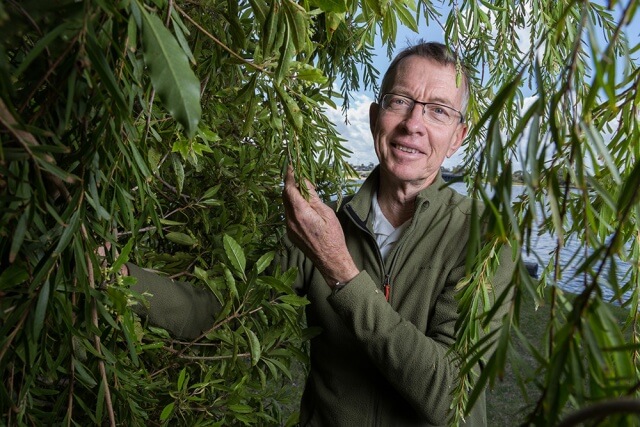What started as a childhood curiosity for the bush has resulted in the state’s highest scientific accolade for Curtin University Professor Kingsley Dixon.
Prof Dixon, a bush conservation and restoration scientist, was crowned WA Scientist of the Year by Premier and Science Minister Colin Barnett at the Premier’s Science Awards last week.
As the former foundation director of science at the Botanic Gardens and Parks Authority, he has been credited as the driving force behind its research excellence.
Along with his team, he is also widely known for discovering the specific chemical in smoke responsible for germination in many of Australia’s plants.
He started on his career path at a very young age.
“I was three or four years old, I was born hardwired to love the bush, love plants and love the way plants and animals interacted,” he said.
“Then I had parents and grandparents who were great gardeners so always having natural things around me was a part of life and just a natural sense of inquiry.”
He said WA science was on a good path but adults should be encouraging children to be more inquisitive.
“I was always getting my hands slapped for touching things,” he said.
“I remember that, I actually think, ‘should you do that’?
“We should encourage it, what it is you’re reaching out, trying to engage with the world you’re trying to understand.
“It’s all just part of discovery and that’s what science is, it’s a process of discovery. We use fairly robust procedures to ensure that we get a fact rather than a myth.
“For a population of two million, we’re tiny, we’re puny. Sure America has more Nobel prize winners than any other country, Harvard is the number one university, UWA is ranked 96 but we’re only 2.5 million people and we punch well above our weight.”
Prof Dixon said science would become more and more important into the future.

“It’s a fundamental plank in the future global economy otherwise we will be buying other people’s knowhow and we’ll be paying a great deal for it,” he said.
“Dumb cultures have come and they’ve gone, smart cultures always survive.”
He said he didn’t expect to win the award given the tough competition.
“Absolutely didn’t expect it, there are so many fabulous top class scientists in WA and the other people that were lined up as finalists, I thought they are so meritorious, really wonderful people and wonderful science.”
Not just a bush scientist but an enthusiast as well, he said he would take some time to soak up his award with a WA wildflower tour and encouraged others to do the same.
“I’m actually going to go next week, unashamedly, on a two-day wildflower watching tour.
Not a skerrick of science out there, it’s just going to be having a look at flowers,” he said.
“Any West Australian who doesn’t look at wildflowers this year is not a West Australian.”
Curtin University also won the Science Engagement Initiative of the Year for its program Fireballs in the Sky, which encourages people to film and record the paths of meteorites with their phone.
More than 89,000 West Australians have used the program through hands-on activities, talks and events.
Visit dpc.wa.gov.au/science.














